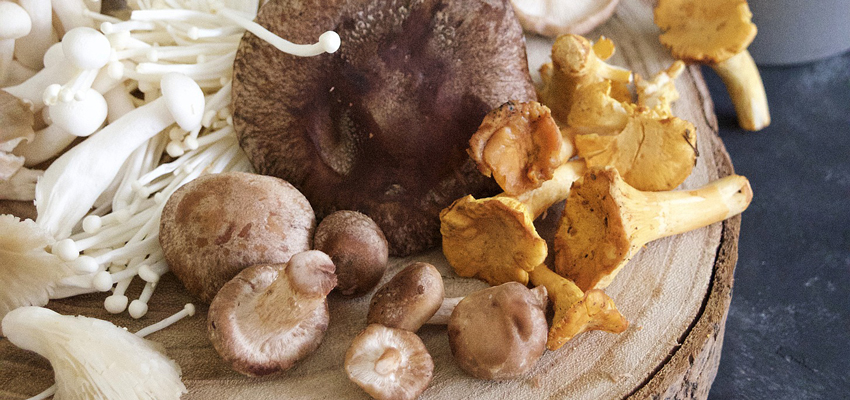In the current autumn weather the mushrooms do not only sprout in our native forests and let the mushroom lovers swarm out with baskets and knives. The range of cultivated mushrooms is available all year round and is becoming more and more varied.
While ten years ago the association of consumers with the term "mushrooms" rarely went beyond canned mushrooms, today every vegetable department contains at least fresh mushrooms, oyster and herb mushrooms and even shiitake mushrooms. In addition there are seasonally offered wild mushrooms such as chanterelles and porcini mushrooms.
Mushrooms are considered valuable food. They are rich in protein, minerals and vitamins. But mushrooms are also known for being able to absorb and accumulate pollutants from the soil or substrate, e.g. heavy metals and radioactive isotopes. This is a particular problem with wild mushrooms. Many mushrooms are produced from the Russian. Federation, Belarus and Ukraine to Western Europe. To this day, traces of the radioactive fallout from the Chernobyl disaster can be found in mushrooms from the regions. The radiation doses are now low and below the limits, but it is recommended not to consume wild mushrooms more than once a week, also because of the potentially high heavy metal load (cadmium).
Another risk is the mechanical sensitivity and perishability of mushrooms, which, once harvested, are usually packaged in closed plastic trays. Pressure points, moisture, poor air circulation and interruptions in the cold chains quickly lead to rot in sensitive products. Mould infestation is not always visually recognizable.
In the case of cultivated fungi grown on special substrates, the risk of heavy metal or radioactive contamination is significantly lower. However, one must also be able to rely here on the fact that the substrates used, often straw and wood bales, were produced from residue-free raw materials, because the fungal network could easily absorb undesirable substances from PCB-containing wood chippings or pesticide-loaded straw bales and enrich them in the fruiting body. There is also a risk of microbial spoilage of the product in the case of cultivated mushrooms, depending on the packaging, transport and location conditions.
In addition to edible mushrooms, "adaptogenic/medicinal mushrooms" now have a firm place in the dietary supplement sector. Whether dried, extracted, as powder or in capsule form, pure or in combination, e.g. enriched with plant extracts or vitamins, the range on offer, especially on the Internet, is unmanageable.
|
Mushroom |
In TCM known for (selection – not approved) |
|
Reishi (Ganoderma lucidum) |
Supports immune system, relieves stress and anxiety |
|
Lion`s Mane ( Hericium erinaceus) |
Supports brain function, supports digestions system |
|
Shiitake (Lentinula edodes) |
Supports immune system |
|
Maitake (Grifola frondosa) |
Supports immune system, balances blood sugar level |
|
Cordyceps (Cordyceps sinensis) |
Supports lung function, promotes physical endurance |
|
Turkey tail (Coriolus versicolor) |
Supports immune system, supports liver function |
For all edible mushrooms it is recommended to take the necessary measures to ensure quality and consumer protection:
- Several times daily a visual control of the goods offered in the shop,
- in addition, regular random testing for pesticide residues (e.g. Chlormequat/Mepiquat), environmental contaminants such as heavy metals and
- Verification of microbiological quality.
- For wild mushrooms additionally: measurement of radionuclides; if necessary, verification of the geographical indication of source
In the case of medicinal mushroom preparations, the risk of fraudulent manipulation must be effectively minimised in addition to the self-monitoring of the raw materials mentioned above. The medicinal mushroom powders and extracts are often obtained from sources that elude independent on-site inspection of the production conditions. Certificates of analysis from non-accredited laboratories in the countries of origin must be evaluated with scepticism.
For good reason, all renowned suppliers of Chinese medicinal mushroom preparations now rely on the product-specific and risk-oriented test plans proposed by our AGROLAB laboratories. The independent and regular control of the products on the food supplements tested in this way is confirmed by our AGROLAB seal.
YOUR PLUS: When it comes to the safety of edible mushrooms, mushroom extracts and food supplements made from them, there is no way around the AGROLAB experts. Let`s talk.

Food Integrity Testing Services
Autor: Dr. Frank Mörsberger

 Contact
Contact

 Contact
Contact Career
Career